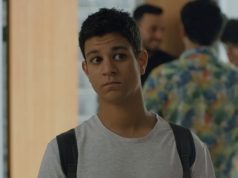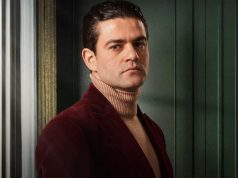Samih Sawiris
A Business Legend, An International Man of Humor, and A Humble Proud Egyptian
Interview by Shorouk Abbas & Francesca Sullivan
 Samih Sawiris breezes into Left Bank café, Zamalek on a busy holiday afternoon in a casual sweater and pants, with the relaxed air of a man comfortable in his own skin. Fortune and its accompanying fame (patriarch Onsi Sawiris and his three sons are all on the Forbes list of the world’s wealthiest men) have made him recognizable, yet his affable manner, plus an innate sense of courtesy make him easy to talk to. Accumulating money may be a serious business, but behind those twinkling eyes a joke never seems far from the surface. Indeed, last year Sawiris was awarded the Annual Humour Award in Switzerland, his part-time adopted home of recent times, an accolade which may seem surprising for an entrepreneur. “They gave it to me for my ability to keep laughing despite life’s adversities,” he says with a slightly rueful smile.
Samih Sawiris breezes into Left Bank café, Zamalek on a busy holiday afternoon in a casual sweater and pants, with the relaxed air of a man comfortable in his own skin. Fortune and its accompanying fame (patriarch Onsi Sawiris and his three sons are all on the Forbes list of the world’s wealthiest men) have made him recognizable, yet his affable manner, plus an innate sense of courtesy make him easy to talk to. Accumulating money may be a serious business, but behind those twinkling eyes a joke never seems far from the surface. Indeed, last year Sawiris was awarded the Annual Humour Award in Switzerland, his part-time adopted home of recent times, an accolade which may seem surprising for an entrepreneur. “They gave it to me for my ability to keep laughing despite life’s adversities,” he says with a slightly rueful smile.
Switzerland is the location for Andermatt, the Alpine holiday resort he has created to equal El Gouna as a dream destination for the European travel market. It has also provided something of a refuge during the turbulent political times in Egypt over the past two years. His latest European venture, Lustica Bay in Montenegro, is under construction and will include 1500 residences and hotels, as well as two marinas and an eighteen-hole golf course. But Sawiris, though he may be an international mover and shaker, has not forgotten his hopes and dreams for his own country, and is about to launch an extraordinary and ambitious plan to build one thousand new schools across the nation in a bid to challenge the ongoing problem of illiteracy. A family man with a social conscience as well as ambition, Sawiris claims he is less of a thrill-seeking risk taker than his brothers. Nevertheless, success on such a grand scale suggests a fascinating degree of both temerity and drive. Cairo East Magazine went to find out more.
CEM: What do you consider Egypt’s best assets and opportunities for economic growth and social development?
S.S.: Its location, its accessibility, relatively cheap work force and good climate, these are all things that make Egypt ideal for building. Factories, hotels, whatever the infrastructure, it all makes for a leaner investment. Plus it has all the ingredients for an amazing touristic destination: there’s no seasonality, it works all year round, there are no extremes of weather, it has beautiful scenery, beaches, history – we have it all! But there is an urgent need to unleash all these opportunities and allow people to use the natural wealth of the country and its labor force to develop investment, foreign currency generation and growth. The ratio of young people to old is huge compared to many developed countries where the aging population represents a potential threat to their economies; there is really no limit to what we could achieve here.
How would you compare your own personal aspirations pre-2011 and now?

Well before 2011 I was aware that the situation in Egypt had to change, and that the tension between those who wanted change and those who refused to accept it was bound to grow and one day explode. That’s why in 2008 I had already moved my company’s headquarters outside Egypt (to Switzerland) so as not to be at the mercy of the unknown. The regime was feeling less and less accountable and no longer listening to the voice of the people. The way things are now it’s far too early to judge. What we have is a change of guard – albeit a good guard – but I sincerely hope that everyone realizes this not enough; the whole system needs a complete shake-up, not only the rulers. An entrenched system developed over fifty or sixty years cannot be fixed in the same number of days or months. Above all, any government in power needs to be more sensitive to the needs and aspirations of the population. Never underestimate the power of angry people! What gives me hope is that the rulers from now on, whoever they may be, will know that if the people are not happy then they cannot succeed.
What is your opinion about the way the international press has covered political events in Egypt over the past two years?
It has not been fair by any means. I have spent much of the past two years living abroad, so I’ve seen first-hand the way political events in Egypt have been dealt with by the foreign press. But then the media is not really about honest reporting, and we ourselves in Egypt are not professional in the way we approach the media. Others are, so they win, we lose. In my opinion if you don’t present yourself properly to others, you cannot blame them for misrepresenting you! Although you’ve always been a strong supporter of Egyptian development you have also branched out with international projects.
Can you tell us more about your new resort project in Montenegro, and why you chose that location?
Orascom has been and continues to develop many projects outside Egypt over the past fifteen years, and geographically we need to be in a place central to all our other interests – in the UK, Switzerland, Jordan, Morocco, the UAE, Romania. Montenegro is one of the most beautiful and unspoilt places on the Mediterranean. It has everything going for it as far as investment is concerned: an extremely stable government, a refreshing lack of bureaucracy and an open attitude to business. Small countries are more efficient because everyone knows everyone. If I want to meet with the ministers of tourism, finance and housing, for example, I can invite them all for coffee at the same time and get things done! The site we have chosen for development has extraordinary touristic potential with a stunning natural environment and easy access to all of Europe. Both France and Italy, for example, are only an hour away.

Being a pioneer in the region also gives us the edge. Not many European real estate developers have the size and scope of Orascom. It goes without saying that we have strong environmental priorities in terms of development – something we have proven in El Gouna, which is working towards being the world’s first town with a carbon neutral footprint, with the help of both the Egyptian and Italian governments.
Tell us more about your ‘1000 Schools’ project in Egypt?
Without education Egypt will always remain poor. Everyone knows that a professional, educated engineer earns more than an illiterate person of the same age; you cannot create wealth in an illiterate population.
The road to education starts by making it available, and that means the infrastructure: build more schools. People talk a lot in this country about the quality of education, but I am a pragmatist. There’s no sense in discussing the quality of a meal if you’ve no money to buy it. Even if kids are jammed 80 to a classroom, at least their fundamental right has been covered. All over Egypt kids are walking an hour or two just to get to a crowded classroom where there is just one school between three villages, for example. So my project aims to reduce the commute for children as well as the numbers in the classroom. If it were up to me, I would close half the universities and spend the money on elementary schools. I am a great believer in respecting sequences in life! In this country we often fail to do anything because we are trying to do everything at the same time. As the famous quote goes, “A journey of 1000 miles begins with one step.”
My new project is literally to build 1000 new schools in locations all around the country. We will begin by formally fundraising abroad – and I will be putting in a substantial amount of my own money to encourage other investors.
In terms of the quality of education, realistically it cannot take less than eighteen years – the time for a prospective teacher to pass through the education system – to re-educate teachers. There is also another problem: it’s difficult for the teacher to learn from his student. Egypt feels it taught the rest of the Arab world, so now, even though countries like Jordan and the UAE have a much better education system, we are too arrogant to take advice from them!
You’ve always been an innovator and forward thinker when it comes to creating new projects. What inspires you?
I am at a point in my life in which I don’t need to build a career – I can leave that to younger men. What excites me are single individual projects and challenges that take my imagination.
Is there any one person who has had a strong influence on your life?
Dr. Fathi Eskander, who was my father’s closest friend.
None whatsoever. If I had my life over again I’d do everything just the same! I have always followed my gut feelings and I don’t believe in setting goals and following them relentlessly – adjust the target to suit the life you are living, and keep it flexible. I’ve seen too many people wasting their lives following a target, neglecting their health, their families; the things that are ultimately important. I would never aim for a target that involved giving up the things I enjoy! The thing about money is that it’s all too easy to let it take control of you – and that happens to a lot of people.
What are you most proud of?
Of staying happy throughout my life, despite some very rocky times in the past couple of years.
I can also recall a particular moment that made me very proud. Twenty years ago the Minister of Tourism visited the El Gouna project in July, while it was still under construction. When he asked when it would open I told him, “In October”. He assumed I meant the following year, and asked me “Why do you need so much time?” When I told him I meant in that October he made a bet it couldn’t be done. He lost!
What qualities do you wish to see in your children as they carve out their own lives and careers?
The most important thing to me is that they live happily. I don’t need them to achieve success or fame; just to be proud of themselves and to have empathy for others. And to earn what they spend!
What’s the best advice you’ve ever been given?
When doing business, always make sure that the other is guy is getting a good deal. That way you generate respect and something to build on – they will keep coming back.
If you could have had another career, what would it have been?
A musician; or better still a composer. One person I met in my life who made me feel totally humble was Yehudi Menuhin.
If you could meet anyone, alive or dead, who would it be?
The Prophet Mohamed, Jesus Christ and Moses – we could have a very interesting discussion!
What’s your favorite meal?
Knuckles, brain and tripe. Ah, I see from your reaction we won’t be eating together any time soon!
The last book you read?
Eskendereya fe Gheme by Ibrahim Abdel Megid, plus the autobiography of Warren Buffet.







Comments are closed.